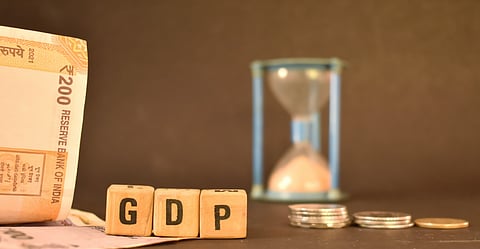The gross deprived parameter
“What is GDP?” Sukru Ojha, a resident of Koraput town in Odisha, asks in response to my question: “Do you know India’s GDP will soon surpass Japan’s?” I have been following Ojha’s life since 1996, when I first met him during a reporting assignment covering the severe drought that had gripped the region, one of the poorest in the country. Now 60, Ojha still lives on daily wages and does not bother to know what GDP is all about.
GDP as an acronym is as common as a PIN or PAN. Ojha knows what PIN is, even though he does not know its full form. After carefully listening to my explanation of GDP—that it is the Gross Domestic Product, the commonly used measure for an economy, capturing monetary values of all goods and services produced in a country in a specified duration— Ojha gives a jocular response, which is a serious comment on this method of measuring a country’s economic well-being. “It doesn’t contribute to my life. I remain as poor as I have been since birth,” he says. “Nor do I contribute to GDP. My economy is zero.” Ojha had fled his village in Koraput district after his parents died of starvation during the 1996 drought. Earlier, during a conversation at the height of the COVID-19 pandemic, he had said: “I have seen more hunger than food. Hunger is an adaptation method for me.”
India is projected to become the third largest economy, with estimates indicating that its GDP will reach $5 trillion in the next two years. This milestone is already being celebrated even before it has been achieved. But does a country’s GDP reflect the true economic levels of its citizens? Or, to put it another way, does an impressive GDP translate into higher living standards for its citizens? India’s GDP was around $60 billion in 1965, the year Ojha was born. In 2025, it is expected to be a bit over $4 trillion. Ojha’s own economy has not kept pace with this huge leap in GDP. Rather, in 2020-21, during the pandemic, he nearly stopped earning anything. “The highest I have ever earned was Rs 3,000 a month a few years ago. In recent years, I have seen a steady decrease in my income as price rise is steep,” he says.
There is a global backlash against GDP as the measure of an economy, as it hardly reflects the well-being of people and fails to capture income distribution. “GDP is a deeply foolish indicator of how we’re doing economically. It measures the gross volume of monetary transactions in the economy—but it doesn’t care what the money got spent on, and it doesn’t care about the elements of our economic well-being that come to us without a price tag,” said US-based economist Eric Zencey, who champions an alternative to GDP, called Genuine Progress Indicator (GPI). By design, GDP does not include informal economy, like that of Ojha and the country’s dominant economy. Even Simon Kuznets, who developed the concept of GDP, cautioned the US Congress in 1934 that it was an “inaccurate” calculation and was not meant to assess an economy’s true welfare nature.
At the 2018 meeting of G7—an informal bloc of major developed economies —in Canada, the heads of the countries also agreed that “GDP alone is insufficient for measuring success”. In 2021, the UN in its “Our Common Agenda” made an urgent call to “improve national measures of progress beyond GDP.” The UNEP’s “Inclusive Wealth Report 2023”, after analysing the state of inclusive wealth in 166 countries, said, “The problematic bit in GDP is not its aggregative character but that it is the wrong aggregate. The rogue word for which GDP is an acronym is ‘gross’ because the measure does not record the depreciation of capital assets that accompanies economic activities.”


